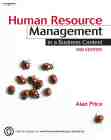
Employee Relations

 Employee Relations |
|

|
|
HRM Guide publishes articles and news releases about HR surveys, employment law, human resource research, HR books and careers that bridge the gap between theory and practice. |
 Human Resource Management in a Business Context, 3rd edition by Alan Price Human Resource Management in a Business Context provides an international focus on the theory and practice of people management. A thorough and comprehensive overview of all the key aspects of HRM, including articles from HRM Guide and other sources, key concepts, review questions and case studies for discussion and analysis. More information and prices from: Amazon.co.uk - British pounds Amazon.com - US dollars Amazon.ca - Canadian dollars Amazon.de - Euros Amazon.fr - Euros |
Employee relations - international aspects
By comparison with many other countries, the management of people in Germany is tightly
controlled by legal processes. (...) As a result of the various codetermination laws since 1945,
Germany has evolved a system which focuses on industrial democracy and harmony. But there have been significant problems since the reunification of East and West Germany and
subsequent economic difficulties..
|
|